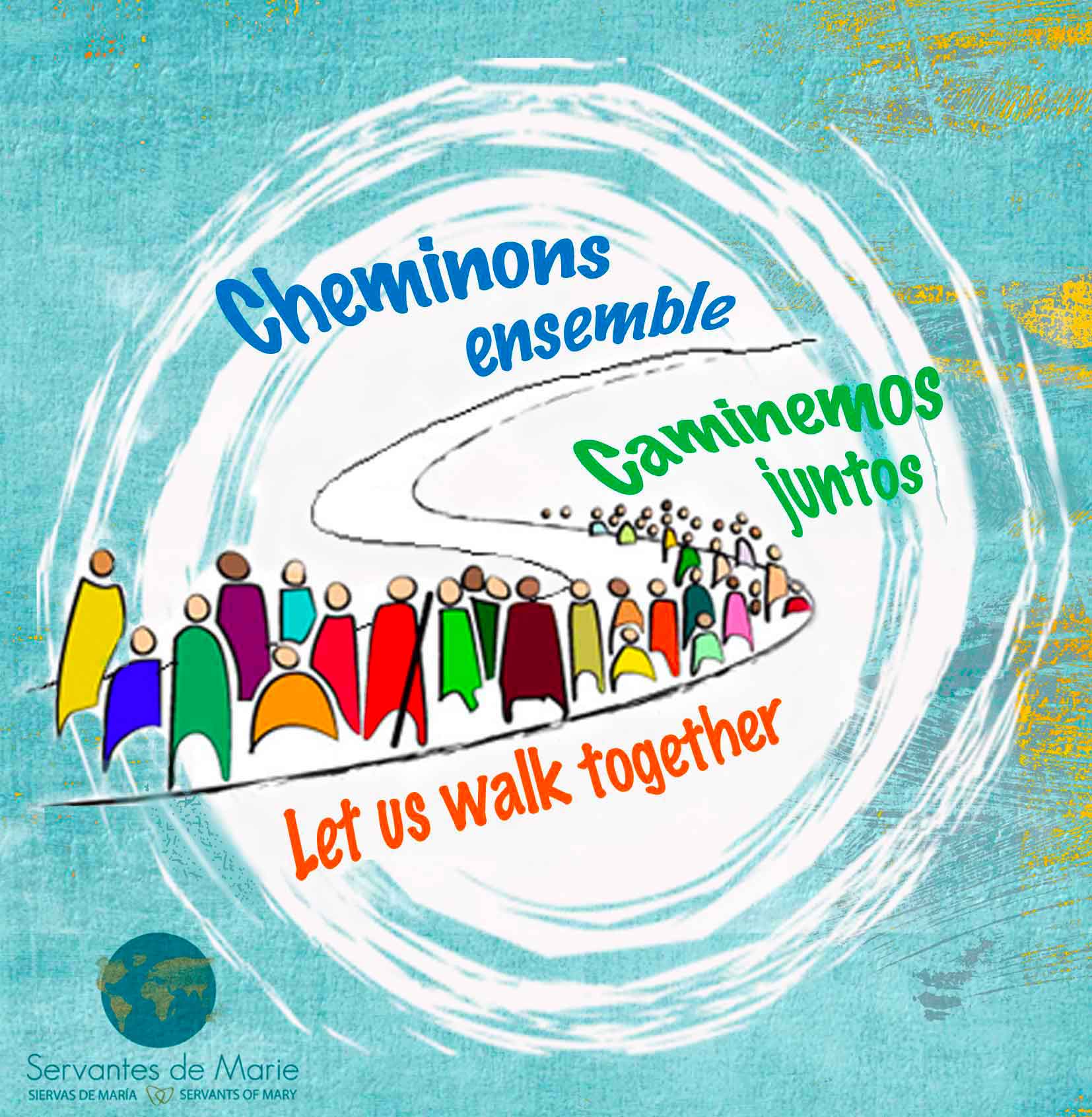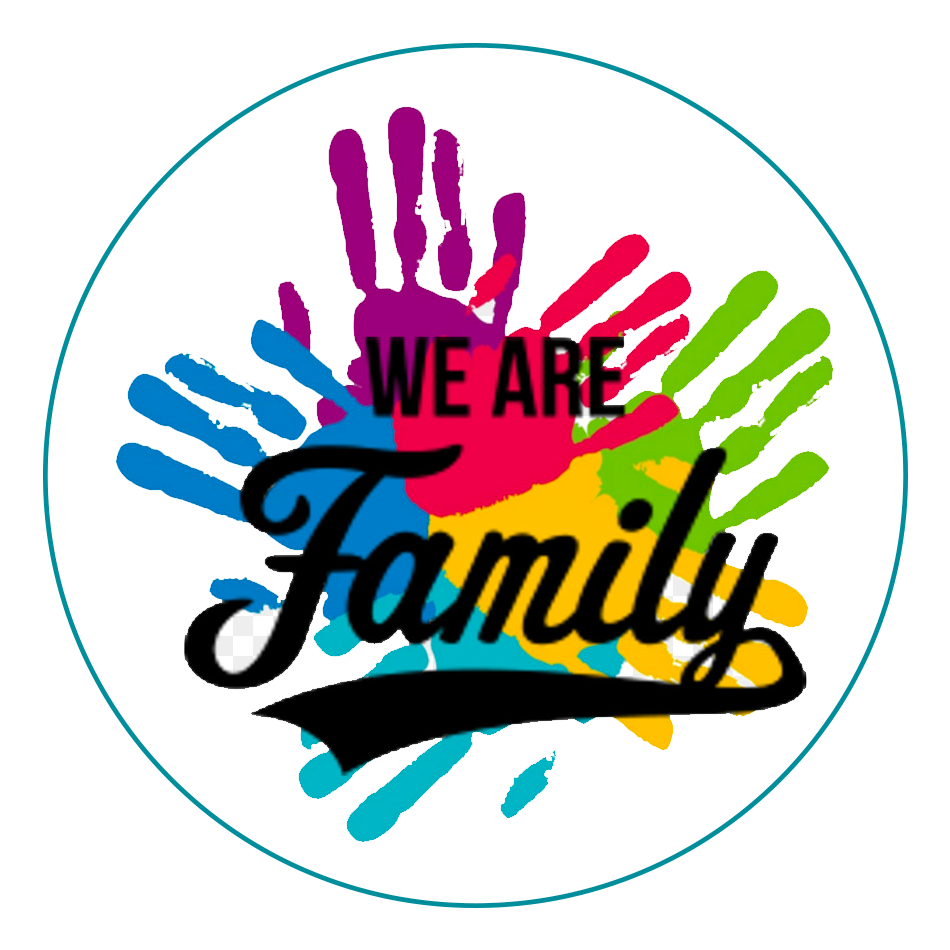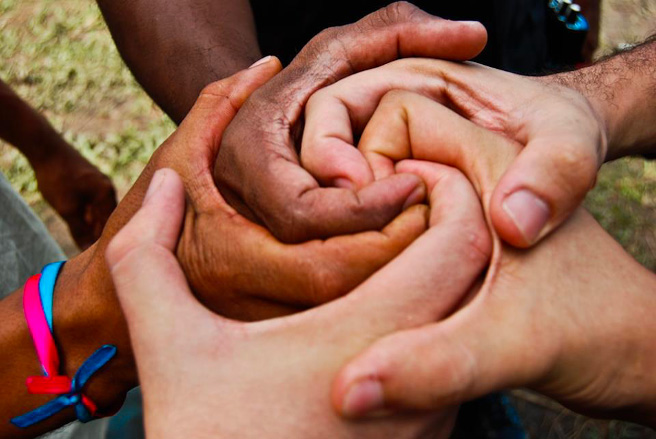
"WE ARE FAMILY" - APRIL 2022
Let's walk together - Letter April 2022 
Dear readers,
Many of you have been interested in reading us last year, from different continents. We thank you for the warm welcome given to the 4 letters "We are the Earth".
We are Family
For this year 2022, we have decided to address the theme of fraternity, "We are family", around 3 letters that will be published in April, August and December 2022.
You will find below the first letter which, after defining the notion of fraternity, will define it: in law, in morality, in religion (taking some examples: Christianity, Islam and Judaism).
We would be happy to receive your reactions on fraternity in your daily life, via email or Facebook.

"Faith leads the believer to see the other as a brother to be supported and loved ... The believer is led to express this human brotherhood by safeguarding creation and the whole universe and by supporting each person, especially those who are most in need and the poorest." - Pope Francis
What is fraternity?
Fraternity or fraternal friendship is, in the popular sense of the term, the expression of the emotional and moral bond that unites a brotherhood. By extension, this notion describes a bond of solidarity and friendship at other levels than those of the family.
Universal brotherhood is evoked in many ideologies: Christianity, Islam, Judaism, ecumenism, inter-religious dialogue, internationalism... It is the idea that all human beings are brothers and sisters and should behave as such towards each other. It is a state of unity between several people, which brings together several "I's" to make a "we" in the service of respect for the human person.
Although fraternity in its restrictive sense concerns only brothers, a feminine equivalent has been created: sorority, a name built from the Latin word "soror" which means sister or cousin.
Fraternity has several applications: law, morality, religion.
Fraternity in law: examples in French law
 First article of the Universal Declaration of Human Rights (1948): "All human beings are born free and equal in dignity and rights. They are endowed with reason and conscience and should act towards one another in a spirit of brotherhood."
First article of the Universal Declaration of Human Rights (1948): "All human beings are born free and equal in dignity and rights. They are endowed with reason and conscience and should act towards one another in a spirit of brotherhood."
- French Constitution of 1958: The motto of the French Republic is "liberty, equality, fraternity". Liberty and equality are rights; fraternity is a duty, a moral obligation of the individual towards the community. Until 2018, any French citizen, who came to the aid of an illegal migrant was liable to justice. This was called the crime of solidarity. The French Constitutional Council, in July 2018, considered fraternity as a principle with constitutional value. From this principle derives "the freedom to help others with a humanitarian purpose regardless of the regularization of their stay on the national territory".
- From the Catholic point of view, fraternity implies brotherly love, it is an essential rule for living in a republic, sharing a living space and everyone must contribute to it. The republic offers us to build together. Everyone must be able to put himself in the place of the other: debate on secularism Bayonne, February 2022.
Fraternity in morality
- According to a Stoic moralist: "The unity of the human race, the equality of men, the equal dignity of men and women, respect for the rights of spouses and children, benevolence, love, purity in the family, tolerance and charity towards our fellow beings, humanity in all circumstances and even in the terrible necessity of punishing criminals with death, this is the basis of ideas that fills the books of the last Stoics".
- According to Charles Peguy, poet and writer: "Fraternity is a duty of urgency, that to pull out the miserable ones with misery, more important than the concept of material equality, which would be a duty of convenience".
- According to Jacques Attali, writer and economist: "We can define fraternity as a social order, in which each one would love the other as his own brother ....... Fraternity is a goal of civilization, not a natural state".
Fraternity in religion: some examples
During his apostolic journey to the United Arab Emirates in February 2019, Pope Francis said: "Religions are at the service of brotherhood in the world .... Let us pray for this grace to be given to us to live in full brotherhood with our brothers and sisters of other religions, praying for one another, open to all, and let this grace be communicated to all.... Brotherhood is the anchor of salvation for humanity".
The notion of brotherhood is found in all religions. It is a point of convergence for inter-religious dialogue. "Fraternity is the foundation and the road to peace." - Pope Francis 2014.
• In Christianity
Brotherhood is absolutely central to Christian teaching. It derives from Christ's commandment: "I give you a new commandment: "Love one another, as I have loved you, love one another".
The word "brother" is used by Jesus in the Gospels: "Whoever does the will of my father in heaven, he is my brother, my sister, my mother." - (Mt 12:50).
In Christian religions, the term "diakonia" means "service of the brother" and includes the living testimony of charity.
According to the book "What is the use of a Christian?", by Jean-Guilhem Xerri, psychoanalyst-therapist, the Christian is open to 3 dimensions:
- Humanism: the human person and his or her fulfillment are placed above all other values;
- An anthropological vision of fulfillment, of Judeo-Christian inspiration, where body and spirit are linked in opposition to materialism;
- A specific feature: the resurrection announced by the first risen Christ.
These three dimensions mean that the Christian must bear witness to the values of the Gospel.
Pope Francis in Evangelii Gaudium (§ 92) declares: "There is true healing here, as long as our way of relating to others, by really healing us instead of making us sick, is a mystical, contemplative fraternity. It knows how to look at the sacred greatness of our neighbor, to discover God in every human being, to bear the discomforts of living together by clinging to the love of God, and to open our hearts to divine love in order to look for the happiness of others, just as their Father does".
Fraternity is the subject of the encyclical "Fratelli tutti",of October 4, 2020, which we will discuss in a future letter.
• In Islam
 Islam defines itself as a universal and humanistic religion that addresses the human race as a whole and in its diversity. It has undoubtedly established the bond that unites all human beings regardless of their differences.
Islam defines itself as a universal and humanistic religion that addresses the human race as a whole and in its diversity. It has undoubtedly established the bond that unites all human beings regardless of their differences.
This bond is manifested in the following verse: "O men! We have created you from a male and a female, and We have made you into peoples and tribes, that you may know each other" - (Qur'an §49 v13). A call to all humanity.
This verse establishes the principle of human brotherhood, descendants of the same father and mother (Adam and Eve). All men are brothers, humanity is one family, disregarding all the factors that differentiate men whether they are social, national, racial, since the origin is common.
"None of you can claim the fullness of faith until you love your brother what he loves for himself", says the prophet.
Brotherhood is one of the fundamental principles that give meaning to belonging to the community. Each being that composes it is called to make a work on him so that fraternity takes life; it is an essential value of the Muslim ethics. Brotherhood is the cement of this community of faith in the image of the prophetic saying: "The believer is for the believer like a building whose bricks support each other".
• In Judaism
Rabbi Philippe Haddad has published a book entitled "Fraternity or the Revolution of Forgiveness". Here are some echoes:
Brotherhood is a central theme in the Torah and in daily life. The fraternal relationship opens to the relationship with the neighbor. In the Bible, the subject of brotherhood inaugurates history. The book of Genesis establishes the principle that brotherhood is not self-evident, that it remains an ideal to be built.
Brother is said "a'h" in Hebrew. It has another meaning "the fireplace", a place of heat but also of burning. Brotherhood should be lived first of all as a family unity, before hoping for the unity of peoples in the name of the unity of God. This unity invites "to sew a bond rather than to fight with one's brother", which is often the case in Genesis.
In principle, in any human relationship, there is me and the other, and the other is the brother. The sibling opens up to the wish of a future with the other, which expresses well the principle of responsibility, thinking of the other and being vigilant towards the other.
Fraternity and father Cestac
He expressed it in many ways, with his Sisters, with the Servants of Mary, with the people he welcomed, with the laity and with other religious. This would be discussed in a future letter.
Fraternity in our daily life: what do you think? Reply to us!
How do you live fraternity in your daily life?
What is the importance of fraternity in your culture, in your religion, with other religions?
Please answer us via email or Facebook.
Prayer for all men and women of good - Pope Francis

you who created all human beings with the same dignity,
breathe into our hearts a fraternal spirit.
Inspire us with a dream of encounter, dialogue, justice and peace.
Help us to create healthier societies
and a more dignified world,
without hunger, without poverty, without violence, without wars.
May our hearts be open to all the peoples and nations of the earth,
to recognize the good and the beauty
that you sow in everyone
to build bonds of unity, common projects,
shared hopes.
Amen.